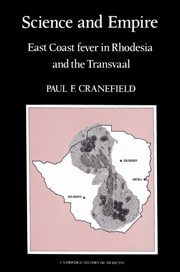Book contents
- Frontmatter
- Contents
- List of illustrations
- Preface
- Acknowledgments
- 1 Prologue
- 2 The places and the players
- 3 A new disease?
- 4 The search for an expert
- 5 Robert Koch in Bulawayo
- 6 Joseph Chamberlain
- 7 Arnold Theiler, Charles Lounsbury and Duncan Hutcheon
- 8 The fight against East Coast fever
- 9 The African-owned cattle in Rhodesia
- 10 Two more parasites and another new disease
- 11 What is East Coast fever?
- 12 Epilogue
- Notes and references
- Index
4 - The search for an expert
Published online by Cambridge University Press: 19 January 2010
- Frontmatter
- Contents
- List of illustrations
- Preface
- Acknowledgments
- 1 Prologue
- 2 The places and the players
- 3 A new disease?
- 4 The search for an expert
- 5 Robert Koch in Bulawayo
- 6 Joseph Chamberlain
- 7 Arnold Theiler, Charles Lounsbury and Duncan Hutcheon
- 8 The fight against East Coast fever
- 9 The African-owned cattle in Rhodesia
- 10 Two more parasites and another new disease
- 11 What is East Coast fever?
- 12 Epilogue
- Notes and references
- Index
Summary
At the stormy meeting held in Bulawayo on July 29, 1902, Kotzé finally promised that he would take steps to obtain an outside expert. He said that he would act as soon as he had consulted the London office; he also wanted to consult Duncan Hutcheon, who was expected to arrive in Salisbury soon. Kotzé did not know that the matter had already been taken out of his hands. On July 22, alarmed by the death of the Natal cattle, the Resident Commissioner, Marshall Clarke, had urged the High Commissioner, Alfred Milner, to obtain an expert to act on behalf of Rhodesia and the South African colonies and Milner had agreed to do so.
During the search that followed, the Chartered Company often acted without telling Clarke or Milner what it was doing, and Milner often failed to tell the Chartered Company what he had done. For that and other reasons the search repeatedly brought the Chartered Company into conflict with the Colonial Office. On December 19, 1902, the choice finally fell on Robert Koch, who was not necessarily the best candidate. From the point of view of the relations between the center and the periphery of the empire, which are discussed again in chapter 12, the search was such a disaster as to be worth documenting in detail. This chapter offers a case history on how not to search for an expert; the reader who is more interested in science than in its governance may wish to turn to chapter 5.
- Type
- Chapter
- Information
- Science and EmpireEast Coast Fever in Rhodesia and the Transvaal, pp. 52 - 86Publisher: Cambridge University PressPrint publication year: 1991

